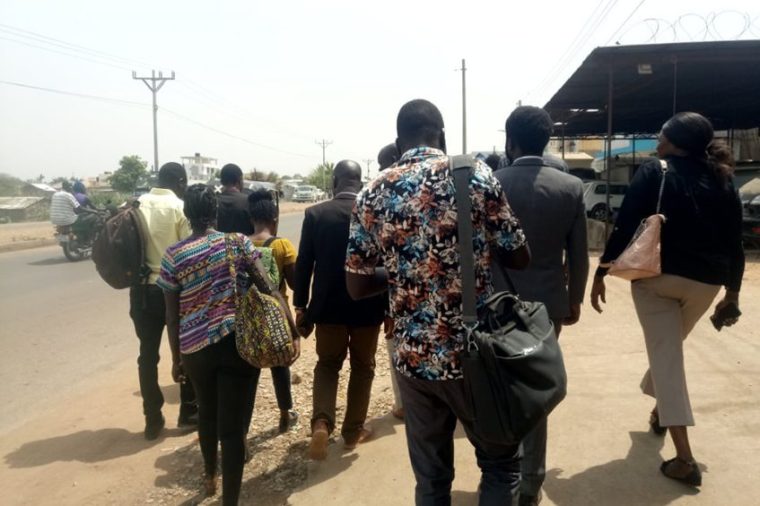New York, February 25, 2022 — South Sudanese authorities should cease harassing and threatening journalists for their work covering the country’s parliament, the Committee to Protect Journalists said Friday.
At about 10 a.m. on Tuesday, February 22, officers with the country’s National Security Service intelligence agency arrested eight journalists on the grounds of the parliament in Juba, the capital, according to news reports, CPJ interviews with several of those journalists, and Patrick Oyet, president of the Union of Journalists of South Sudan, a local trade group, who spoke to CPJ over the phone.
The reporters were covering a press conference that included members of opposition parties when a group of NSS officers halted the briefing on the grounds that it was illegal, seized the journalists’ recording devices, and took them to the parliament’s security office, according to those sources.
The detained journalists included reporters for the U.S. Congress-funded broadcaster Voice of America, The City Review newspaper, Radio Bakhita, Eye Radio, The Insider South Sudan news website, No. 1 Citizen newspaper, and Radio Miraya, according to Oyet and the journalists who spoke with CPJ, who said they were held for about three hours and then released without charge.
“Authorities in South Sudan should focus on ensuring that journalists can effectively cover their nation’s politics, instead of detaining them for doing their jobs,” said Angela Quintal, CPJ’s Africa program coordinator. “Security forces’ harassment and threats toward journalists who sought to cover an event at the country’s legislature show how far authorities are willing to go to control the public discourse.”
Voice of America reporter Winnie Cirino told CPJ that the NSS officers detained her and the other journalists minutes after the press conference began. The Insider South Sudan managing editor David Mono Danga, who also works as a reporter for Voice of America, told CPJ that he believed they were detained because they were covering an event held by opposition politicians.
The press conference sought to address the intimidation of journalists and opposition lawmakers, as well as alleged government mismanagement, according to a press release by the members of parliament who held the conference, which CPJ reviewed.
The NSS officers “decided to put the whole thing on us, the journalists,” The City Review reporter Keji Janefer told CPJ. “They insisted it was our fault.”
At the parliament’s security office, NSS officers attempted to question each journalist individually, but the reporters refused and said they should remain as a group; the officers then accused them of violating the rules concerning coverage of the legislature, The City Review reporter Sheila Ponnie told CPJ.
After about an hour, the officers took the journalists by bus to an NSS office on Bilpam Road, also in Juba, Ponnie said.
Cirino told CPJ that agents held the journalists in a group at that office, seized their phones, and then locked them in a room inside the building, where an officer lectured them on how they should conduct their work.
After an hour, the NSS officers released the journalists without charge and returned their recorders and phones, but told them to delete any recordings of the press conference and threatened that, if the journalists’ outlets published stories covering the conference, the officers would hold them personally responsible, Cirino and Ponnie said.
“That was a serious threat to our lives,” Danga said. “That is a threat to my life and my family.”
Keji said it was “very bad when security personnel start marking you, given the environment we are operating in.”
South Sudan ranked fourth on CPJ’s 2021 Impunity Index, which calculates the number of unsolved journalist murders as a percentage of a country’s population.
Cirino, Danga, and Keji added that they were concerned about the security of information on their phones, as NSS officers had taken them out of their sight during their detention. CPJ has documented how digital forensics technology can be used to extract contacts and other information from journalists’ devices.
Cirino told CPJ that, while they were at the parliament security office, the reporters communicated with Oyet and other journalists, who raised public awareness about the detentions on social media. Cirino and Keji said she believed that awareness and Oyet’s intervention at the Bilpam Road office helped secure their release without charge.
Separately, Ponnie told CPJ that NSS officers at the parliament stopped her while she was working last week, ordered her to hand over her phone and, after she refused, forced her to delete recordings she had made.
When CPJ called NSS Internal Security Bureau Director of Public Relations David John Kumuri for comment, he said he would call back after 30 minutes, but failed to do so. CPJ repeatedly called him back but he did not answer.
Parliamentary spokesperson John Agany Deng told CPJ in a phone interview that the February 22 press conference was “basically illegal” and denied that the journalists had been “arrested,” before the call quality became too poor to understand him; he did not answer subsequent calls from CPJ.
In broadcast media interviews this week, he defended NSS officers’ actions and alleged that the press conference was illegal and proper media procedures were not followed.
CPJ also called Elijah Alier, the managing director of South Sudan’s media authority, and Sapana Abuyi, the authority’s director-general for information and media compliance, but the calls did not go through.
